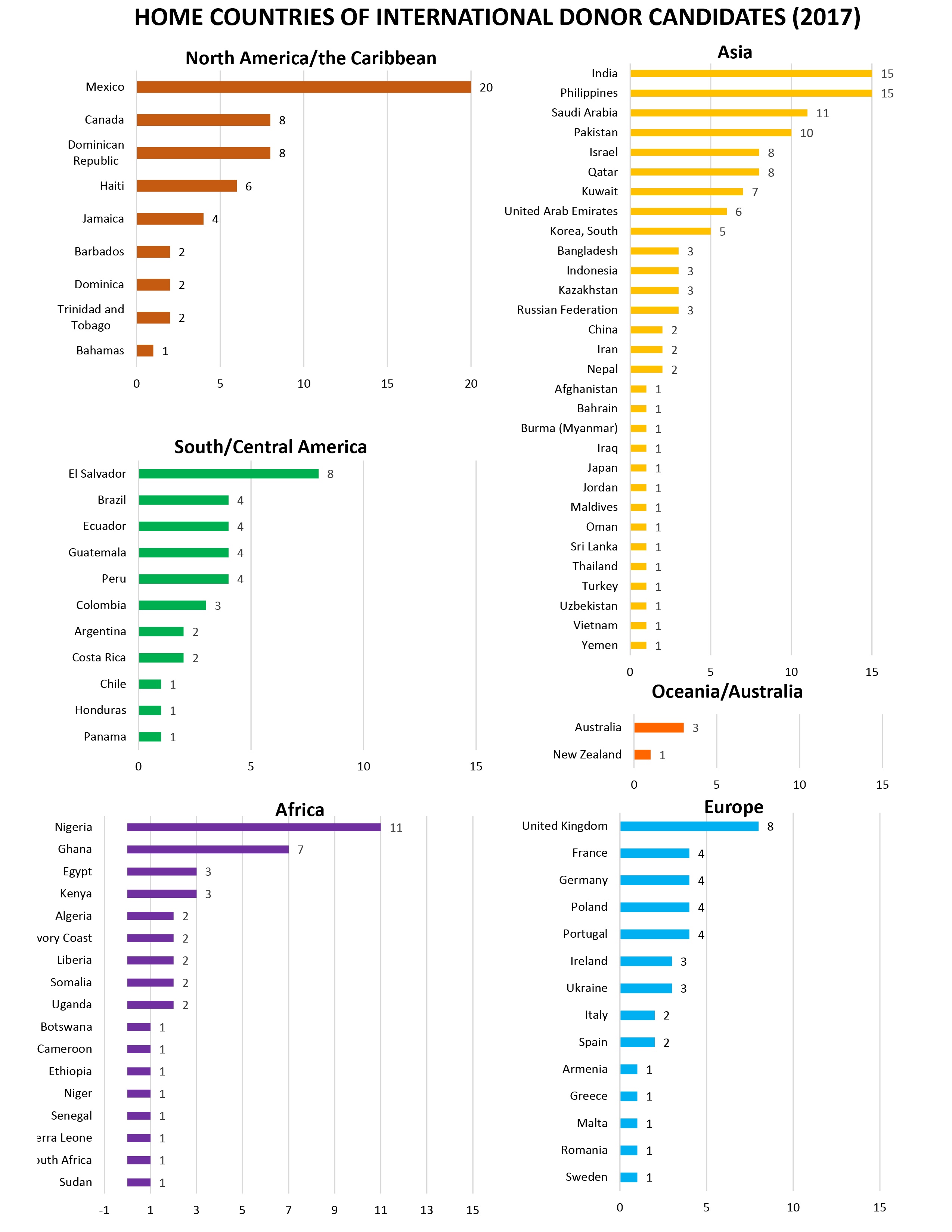Care of International Living Kidney Donor Candidates in the U.S.: A Survey of Contemporary Experience, Practice & Challenges
1Saint Louis Univ, Saint Louis, MO, 2Johns Hopkins, Baltimore, MD, 3Cedars Sinai, Los Angeles, CA, 4Mount Sinai, New York, NY, 5Univ Alabama, Birmingham, AL, 6Vanderbilt, Nashville, TN, 7Georgetown, Washington, DC, 8Univ Wisconsin, Madison, WI, 9UCLA, Los Angeles, CA, 10Univ Virginia, Charlottesville, VA
Meeting: 2019 American Transplant Congress
Abstract number: 544
Keywords: Donation, Kidney transplantation, Resource utilization, Screening
Session Information
Session Name: Concurrent Session: Kidney Living Donor: Selection
Session Type: Concurrent Session
Date: Tuesday, June 4, 2019
Session Time: 4:30pm-6:00pm
 Presentation Time: 4:42pm-4:54pm
Presentation Time: 4:42pm-4:54pm
Location: Ballroom A
*Purpose: The evaluation and care of non-U.S. citizen, non-U.S. residents who wish to come to the U.S. to serve as living kidney donors (LKD) can pose unique challenges. To better understand current practices related to care of international LKD, we surveyed recent experiences of U.S. transplant programs.
*Methods: The survey instrument was distributed to staff at U.S. transplant programs by email and by posting to professional society list-servs, using the Qualtrics survey platform.
*Results: Of 105 respondents, 40% were coordinators, 21% surgeons, 10.5% social workers, 13.3% nephrologists, and 8.6% donor advocates. 91.6% of respondents consider international LKD at their programs. Origin countries of candidates evaluated in 2017 spanned 6 continents, most commonly Asia and North America/the Caribbean (figure).
Among respondents, 46% identify 1 staff member to serve as “point person”, most commonly a coordinator (83.8%). Communication with candidates is predominantly conducted by email (38.7%), telephone (35.5%) and mail (19.5%). 17 reported written evaluation protocols and 25 reported educational materials for candidates.
The most common reasons for closing evaluations in 2017 included visa barriers (24.2%), inability to complete evaluation (13.95%), and program concerns regarding follow-up (11.3%), access to other healthcare (9.8%), donor-recipient relationship (9.8%), financial impacts (8.8%) and motivation (7.7%). Programs that do not evaluate international LKD endorse similar lead concerns. Compared to staff time required for evaluation of a domestic candidate, time for an international candidate evaluation was estimated as >3-fold higher by 29.6%, 1.5 to 3-fold higher by 46.9%, equivalent by 21%, and less by 2.4%.
*Conclusions: The evaluation of international LKD is a resource intensive process that raises key considerations for communication, travel, assurance of motivation, evaluation completion, financial impacts, and access to follow-up care. The lack of written protocols at most programs and the time-consuming nature of these evaluations highlight the need for guidance to support efficient, appropriate care of this unique candidate group.
To cite this abstract in AMA style:
Lentine K, Henderson M, Rasmussen S, Shukhman E, Hunt J, Ammary FAl, Kumar V, Lapointe-Rudow D, Schaefer H, Cooper M, Hays R, Dunbar-Forrest M, Nishio-Lucar A, Mandelbrot D. Care of International Living Kidney Donor Candidates in the U.S.: A Survey of Contemporary Experience, Practice & Challenges [abstract]. Am J Transplant. 2019; 19 (suppl 3). https://atcmeetingabstracts.com/abstract/care-of-international-living-kidney-donor-candidates-in-the-u-s-a-survey-of-contemporary-experience-practice-challenges/. Accessed February 15, 2026.« Back to 2019 American Transplant Congress

